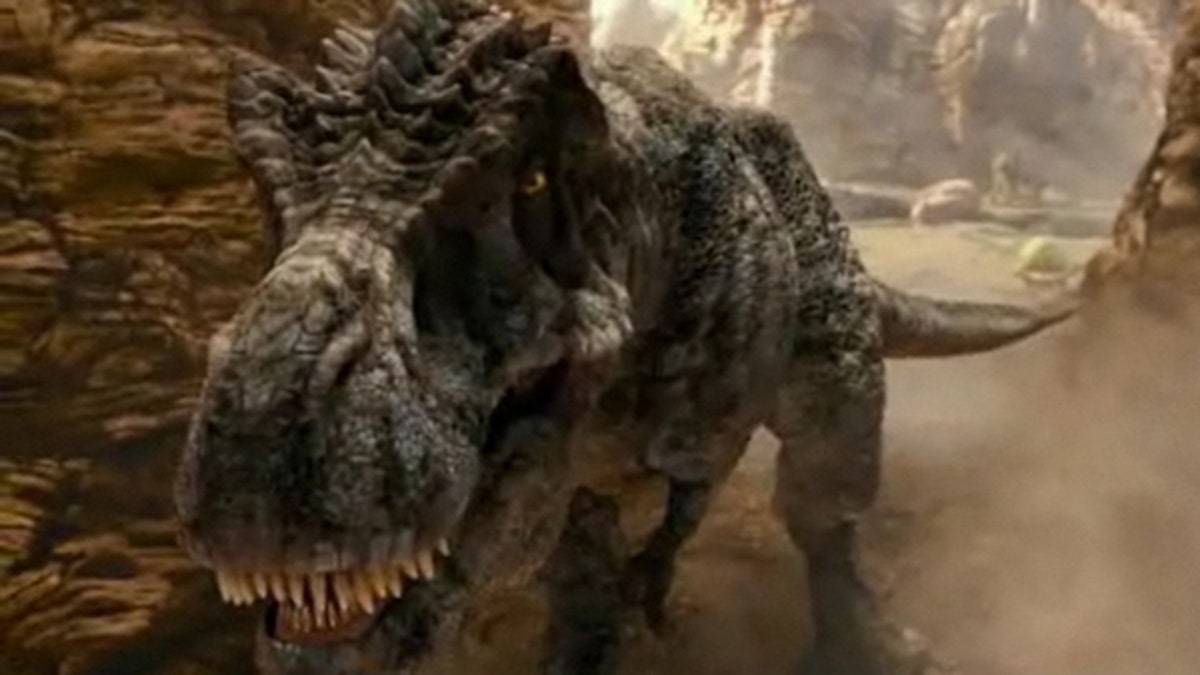
Tyrannosaurus rex stalks his hapless victims in the movie, "Land of the Lost." (Universal Pictures)
SIOUX FALLS, S.D. – The fossilized remains of Tinker the teenage T. rex soon could be returning to the prospectors who unearthed them, after a recent ruling from a federal bankruptcy court.
Most of the 65-million-year-old fossils have spent years in storage in Pennsylvania under the jurisdiction of a trustee, after the man hired to restore them filed for bankruptcy protection. The trustee wanted fossil hunters Ron Frithiof of Austin, Texas, and Kim Hollrah of Iowa to pay $75,000 for services from Barry James and his company, Prehistoric Journeys.
A federal judge ruled last month that they owed just $18,480. Frithiof's attorney, Joe Ellingson, said he assumes his client will finally be able to take possession of Tinker as soon as he pays that amount.
"It's kind of kept things in limbo for so long," he said. "We wanted to take possession of the fossil."
The Tyrannosaurus was unearthed from northwest South Dakota in 1998. Tinker is believed to be the first nearly complete fossilized skeleton of a juvenile T. rex ever found. About a third of the dinosaur has been recovered so far. The bankruptcy case is a short chapter in Tinker's clouded history, which also involved a five-year ownership battle in federal court.
Bankruptcy Judge Mary France estimated in her March 4 ruling that James spent 528 hours working on Tinker and valued his time at $35 per hour. She refused to include other hours claimed by James as well as time his wife and daughter spent on the fossils.
"Barry's estimates of time spent working on Tinker are inflated," France wrote.
The ownership fight in federal court involved Harding County filing a lawsuit in August 2004 alleging that the fossil hunters illegally removed the skeletal remains from county property in South Dakota.
At some point after excavation, Frithiof approached Harding County for a lease after realizing Tinker might have been found on county-owned land. Around the same time, he began negotiations to sell Tinker to the Children's Museum of Indianapolis for $8.5 million.
The 2000 lease agreement stipulated that the legal title to the fossil specimen remains with the lessee, and promises that the county will receive 10 percent of the actual selling price of any fossils collected from county property.
That case was finally closed in 2009 after the 8th U.S. Circuit Court of Appeals ruled that the lease was valid and Frithiof and his partners did not engage in fraud or trespass. The three-judge panel determined he did not have to tell county officials that they discovered the fossil remains years before the November 2000 lease was negotiated and signed.
Since the 8th Circuit ruling, Harding County has extended the lease through January, Ellingson said.
Crews returned to the site last summer, he said, and found a couple of T. rex fossils but made no significant discoveries. The fossil hunters were able to eliminate certain areas, though, and they'll to return this year with an aim to find more. Ellingson said there is some evidence that there are at least parts of other T. rex dinosaurs, one adult and one juvenile.
"We're going to complete the work this summer," he said.
Some people have expressed interest in Tinker, but Ellingson said it's too early for Frithiof to pin down potential buyers.
"Until we get it completely excavated, completely prepped, I don't think he's really solicited buyers to the extent that he will at that point," Ellingson said.




















